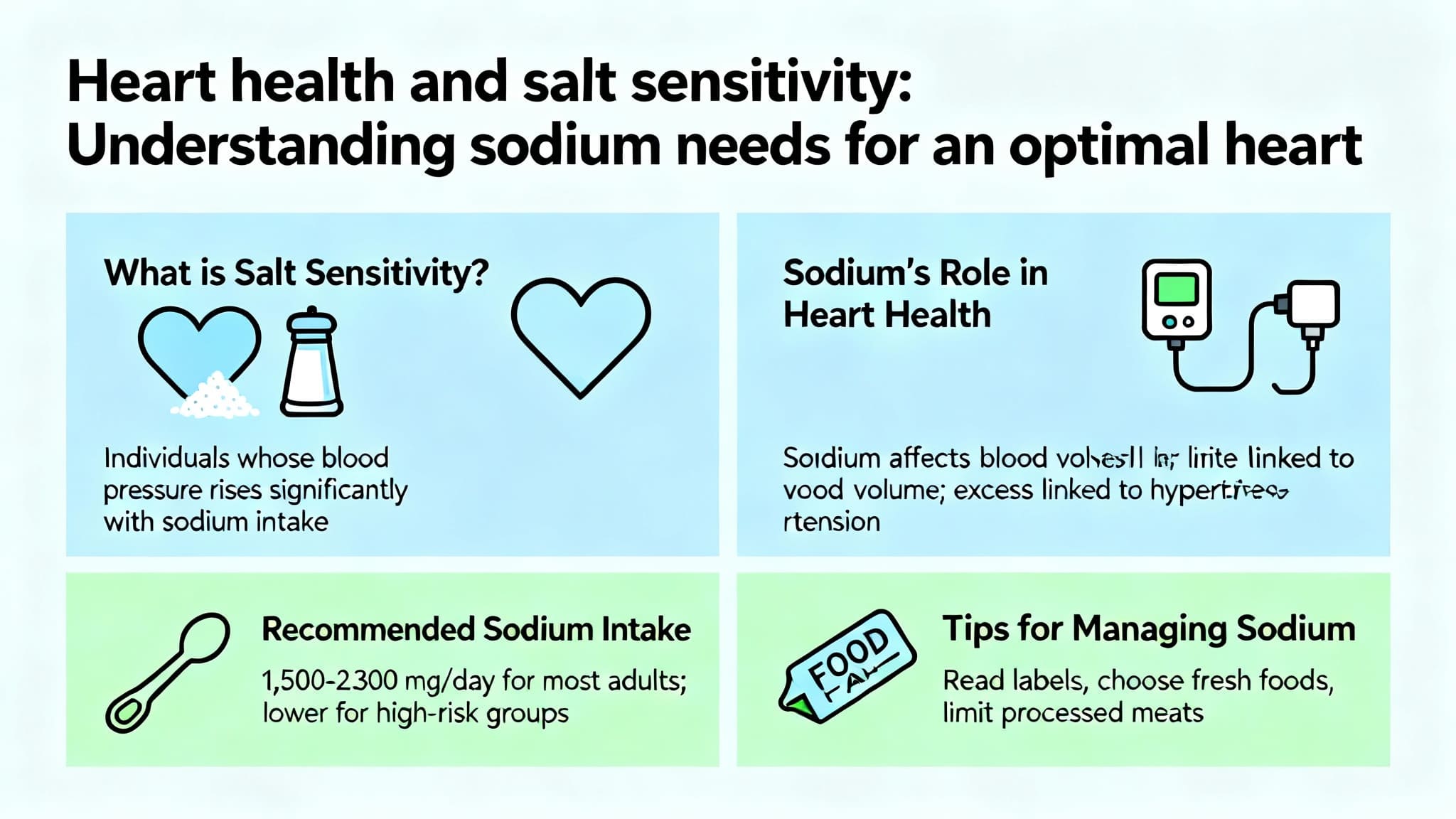Introduction
Salt and sodium are often blamed for poor heart health, but sweeping dietary advice ignores how salt sensitivity varies among individuals. Understanding the difference between salt‑sensitive and salt‑resistant people is vital in customizing heart-healthy habits for an optimal heart. This article explores these nuances—considering athletic needs and whole-diet context—to break down common sodium myths and help you make better choices for your heart health.
What is Salt Sensitivity vs. Salt Resistance?
Salt sensitivity refers to an individual’s blood pressure response to changes in dietary sodium—some people experience significant increases (“salt-sensitive”), while others (“salt-resistant”) show little effect (Elijovich, 2016). Salt resistance means sodium intake doesn’t substantially impact blood pressure. Salt sensitivity has roots in genetics, kidney function, and possibly hormonal balance, all of which link directly to cardiovascular risk (Geraldes, 2023).
Benefits and Outcomes in Heart Disease
Research consistently shows that for salt-sensitive individuals, high sodium intake is associated with higher blood pressure and greater cardiovascular risk (Mente, 2016). For those with salt sensitivity, lowering sodium can support optimal heart health, reducing arterial damage, decreasing the risk of blood clots, and improving cholesterol profiles (He, 2020). Low-sodium diets can decrease systemic inflammation and lower the burden on the cardiovascular system, especially for those at risk for heart disease (Elliott, 2021). While the general population benefits from moderate sodium control, the greatest impact is seen among those with hypertension or a family history of heart issues.
Research Insights
Significant studies have re-evaluated sodium’s role in heart health over the last decade. The PURE Study, which included more than 100,000 people worldwide, found that only those with very high sodium intakes and high blood pressure had substantially increased cardiovascular risk (Mente, 2018). Another systematic review emphasized that salt sensitivity is more common among older adults, those of African descent, and individuals with kidney disease (Kawasaki, 2022). Guidelines from the American Heart Association reinforce reducing sodium—especially for salt-sensitive, hypertensive, or at-risk individuals (AHA, 2023).
Practical Applications
Applying these findings begins with determining your risk profile. If you have hypertension, kidney problems, or a family history of heart disease, consider limiting sodium to under 2,300 mg/day (AHA, 2023). Athletes, on the other hand, may require more sodium, especially during heavy training or in hot conditions, to maintain fluid balance and electrolyte health (Shirreffs, 2019). Opt for whole foods rich in potassium and magnesium to support an optimal heart, and only restrict salt to the degree supported by personal health needs.
Risks & Limitations
Too little sodium can be harmful, leading to hyponatremia, muscle cramps, and poor exercise performance—particularly for athletes or those with high sweat losses (Shirreffs, 2019). Over-restriction has also been linked with metabolic disturbances in some groups (Mente, 2016). Moreover, not all sodium comes from table salt: processed foods are major sources, which often lack beneficial nutrients. Research is ongoing to clarify sodium’s nuanced role in heart health, and recommendations may shift as more is learned.
Key Takeaways
- Salt sensitivity varies—personalize sodium intake for optimal heart health.
- Lowering sodium benefits those with hypertension, kidney disease, or high risk for heart disease.
- Athletes and active individuals may need more sodium for fluid and electrolyte balance.
- A whole-diet approach (emphasizing potassium, magnesium, and unprocessed foods) supports an optimal heart.
- Consult with a healthcare provider before making drastic changes to sodium intake.
Frequently Asked Questions
1. How can I tell if I am salt-sensitive?
Salt sensitivity often requires medical assessment, but those with hypertension or certain risk factors may be more salt-sensitive (Elijovich, 2016).
2. Can athletes safely consume more sodium?
Yes, especially during heavy exercise or hot weather, athletes may benefit from higher sodium for optimal heart health (Shirreffs, 2019).
3. Should everyone follow a low-sodium diet?
No, the greatest benefit is for those with salt sensitivity, high blood pressure, or at high cardiovascular risk (He, 2020).
4. What other nutrients support heart health?
Potassium and magnesium, found in fruits and vegetables, assist in blood pressure regulation and help achieve an optimal heart (Elliott, 2021).
Suggested Links
- American Heart Association: Sodium and Your Health
- NIH: Dietary Sodium Recommendations
- PubMed: Sodium Intake and Blood Pressure
Conclusion
Getting the facts straight about sodium can help you achieve optimal heart health. While many benefit from sodium reduction—especially those who are salt-sensitive or have cardiovascular risk—some, like athletes or salt-resistant people, may have different needs. Focus on whole, minimally processed foods, and consult a healthcare provider to tailor your sodium intake. Taking these steps supports a healthier heart and lifestyle—empowering you toward your optimal heart.



